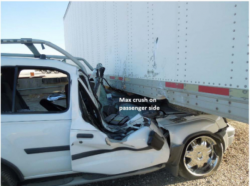
— Nissan is looking at paying more than $36 million after a California appeals court upheld a lower court ruling related to a Nissan Xterra crash from almost 10 years ago.
On August 29, 2012, plaintiff Jose Aguirre was driving his 2000 Nissan Xterra to his workplace. As he entered the parking lot, the Nissan Xterra allegedly accelerated and hit a loading ramp which sent his vehicle into the air and into a parked trailer.
The plaintiff is nearly quadriplegic due to his injuries.
The plaintiff sued Nissan by claiming the 2020 Nissan Xterra had a defect that caused his vehicle to crash. According to the lawsuit, there isn't enough clearance between the accelerator pedal and the parking brake bracket.
This allegedly caused the accelerator pedal to become locked on the top of the parking brake bracket, causing sudden unintended acceleration.
The case was heard by a federal judge who awarded the plaintiff more than $36 million on product liability and negligence claims.
According to the trial court, "the edge of the arm supporting the accelerator pedal became trapped on the edge of the parking brake bracket located immediately to the right, which resulted in the sudden acceleration of the vehicle."
Nissan Appeal
Nissan appealed the $36 million award by arguing there was no evidence the accelerator pedal became trapped on the parking brake bracket and caused the sudden acceleration and crash.
However, the appeals court said it must apply the "substantial evidence standard" and "conclude that a reasonable inference can be drawn from the evidence presented that the defective and negligent design of the parking brake assembly was a substantial factor in the harm to Aguirre."
Nissan next argues that based on the evidence, the trial court judge erred by apportioning 100 percent of fault to Nissan.
Nissan argues Aguirre likely fell asleep at the wheel while his foot was on the accelerator pedal because the plaintiff worked a full-time job and a second part-time job.
The plaintiff also testified he stepped on the brakes when his 2000 Nissan Xterra suddenly accelerated and his foot was on the brake pedal when the vehicle hit the trailer. Yet Aguirre’s own experts testified the brakes would have stopped or slowed the vehicle.
According to Nissan, this shows the plaintiff was wrong by claiming he stepped on the brake pedal because he really fell asleep at the wheel. But the appeals court ruled it was the job of the trial court judge to determine if the plaintiff's testimony was credible.
"Moreover, under the imminent peril doctrine, when his vehicle suddenly accelerated, Aguirre was not required to act with the same level of care as in an ordinary situation. It was for the trial court to determine that Aguirre acted reasonably under the circumstances." — Court of Appeal of the State of California, Third Appellate District
Nissan also pointed to the testimony of the sole witness to the crash. The witness testified under oath he heard the sound of a vehicle traveling at high speed that caused the tires to make noise. The witness says he never saw the Nissan Xterra accelerate because the vehicle was already speeding.
Additionally, the witness testified he never saw the brake lights illuminate, but he did see the plaintiff's head laying against the headrest. The witness couldn't see if the plaintiff had his eyes closed, but Nissan says the evidence shows the driver fell asleep and never touched the brake pedal.
Nissan had tried to introduce the opinion of an expert witness who testified the plaintiff crashed because of drowsiness and “micro-sleeps.”
However, the trial court judge excluded the expert testimony by finding it was "irrelevant and speculative, because there was no evidence that Aguirre was actually drowsy or asleep at the time of the accident."
The Court of Appeal of the State of California, Third Appellate District, agreed the expert's opinion should have been excluded because it was only speculative.




